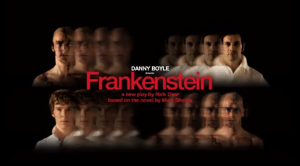
Amidst the extended lockdown being imposed by most countries around the world, many works of entertainment have been available for free online. The most interesting of these to us are the recorded versions of live performances which would be otherwise impossible to watch. This one is a play originally run in 2011 based on Frankenstein. It was directed by Danny Boyle and starred Benedict Cumberbatch as alternately Victor Frankenstein or his creation.
I know about as much as anyone about the story through cultural osmosis but I’ve never read the original novel nor really watched any of the old films. From what I understand this play is not a completely faithful adaptation and is especially creature-centric. Rather than being told in journal form from the perspective of Victor Frankenstein, this version is presented mostly from the point of view of the creature. Indeed it opens with an extended sequence depicting his tortuous birth that has him learning how his own body works through trial and error as his creator has abandoned him. The role involves so much physicality that Cumberbatch seems more like a dancer as he contorts his body into unnatural positions and even later his body language is always erratic despite his immense strength. Intriguingly the play also has extensive scenes showing how the creature learns to speak and to read from the blind De Lacey which I don’t believe happens in the original story.
The stage itself has a minimalist and modernist feel but uses the few props it has to impressive effect. The highlight is a gigantic arrangement of many, many light bulbs that can flood the entire stage with light when needed or create the illusion of stars in the sky. Cumberbatch may be the most famous actor in the troupe but there are plenty of other recognizable faces among the rest of the cast as well. The overall effect is just amazing even if this is a story that should be familiar to everyone and it’s no wonder that this particular version, written by Nick Dear, has also been performed in so many other places.
One interesting facet of this production is that while it invites the audience to sympathize with the creature for the circumstances of his unasked for birth and the subsequent abuse he suffered under the hands of humans, it is also very clear that he has well and truly become evil even if he started out as a blank slate. This version of the creature commits crimes that don’t seem to appear in the original story and his claims that he will leave his creator alone if a female mate is created for him is never convincing. The play doesn’t portray Victor Frankenstein in a good light either but neither does it dwell on his inner psychological state as it does for the creature. In any case, this is a true dual tragedy with no hope of redemption for either. The horror is visceral and powerful with none of the campiness of the film versions.
Obviously watching the recorded performance like this cannot be compared it to seeing it live on the stage. In particular this version involves the camera moving around in a very dynamic way that tries to mimic the sensation of cinema but also makes it sometimes difficult to understand what it is the audience present at the time is truly experiencing. But of course I am very grateful to have the opportunity to watch this at all. This is a fantastic production and I’m glad to be able to say that I finally know the full story of Frankenstein.